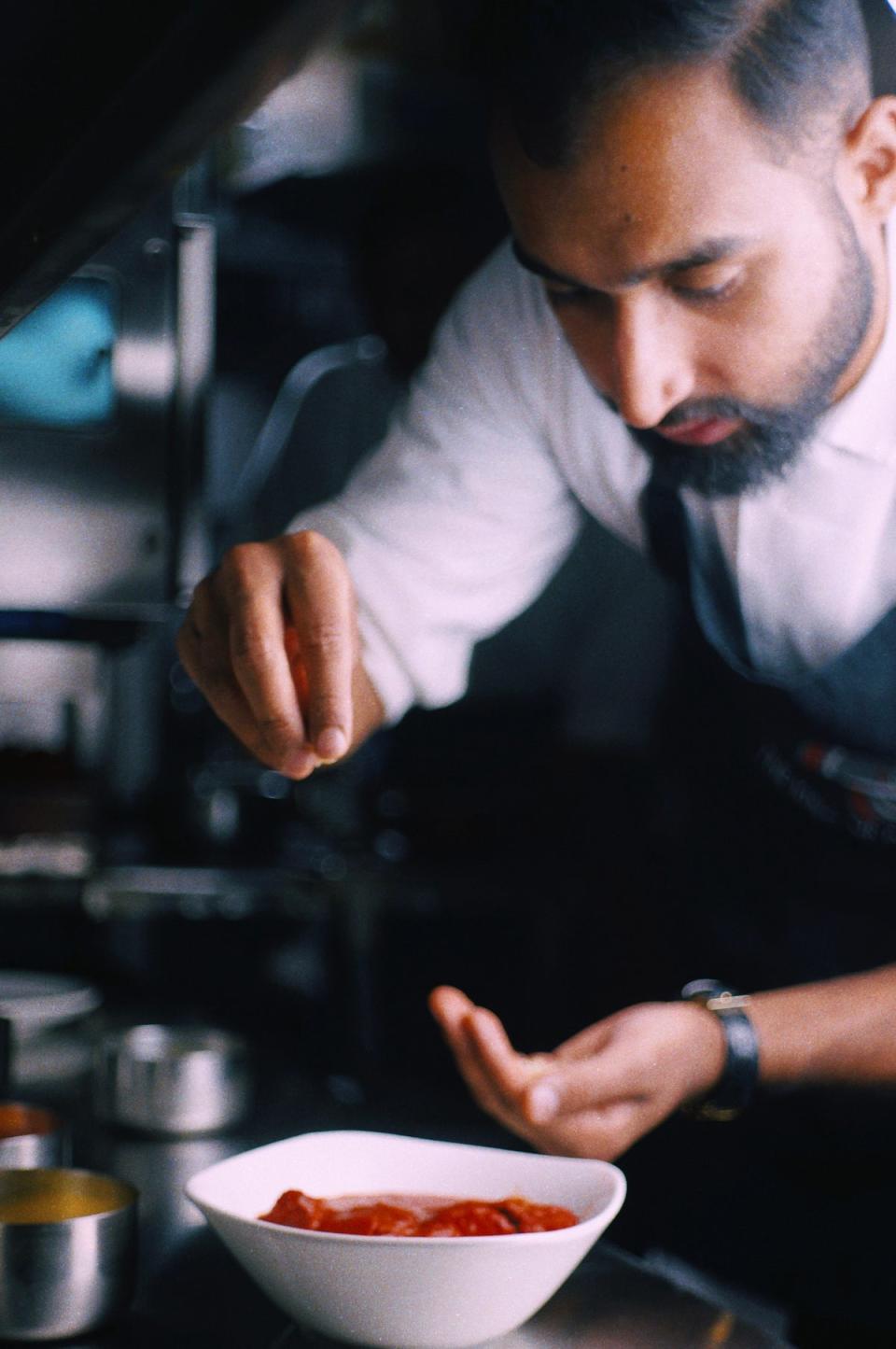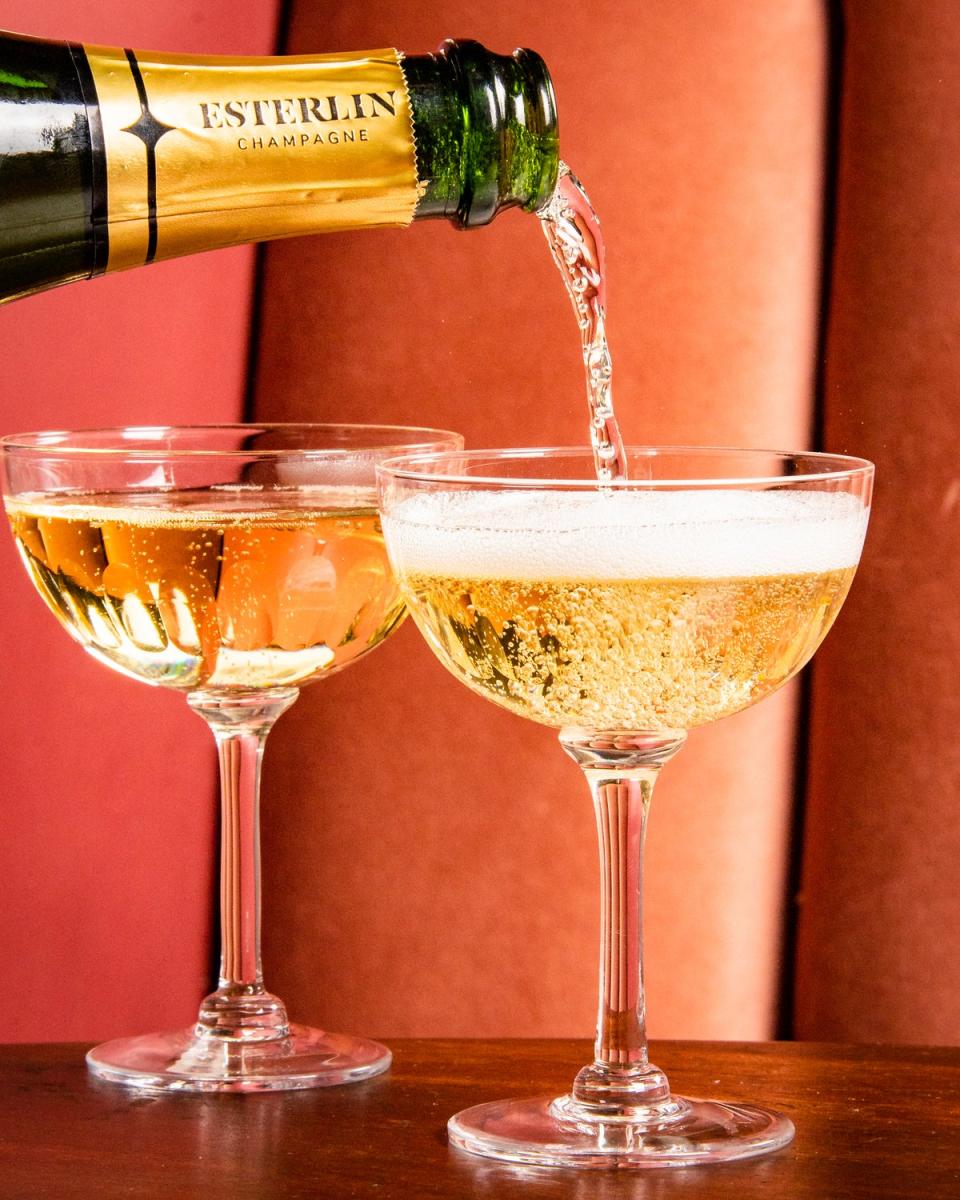You might assume that the best person to ask for advice on where to eat before the theater is a theater critic. One would be wrong. “Press nights usually start at 7pm, so it’s often not realistic to have a full meal before or after a play,” says Nick Curtis, the Standard’s chief theater critic. ‘There’s a telephone box outside the Swiss Cottage toll hall, where I and the Financial Times critic Sarah Hemming once had egg mayonnaise sandwiches before a show at the Hampstead Theatre. That is the reality of dining out for most critics.”
And for many theatergoers, also if you replace the egg mayo with a Big Mac. “As a food culture, we have succumbed to quick bites,” said Tom Harris, who opened Lasdun (National Theatre, Upper Ground, SE1, lasdunrestaurant.com) at the National Theater last July with his business partners John Ogier and Jon Rotheram. “But I think that’s nonsense. You don’t have to grab a sandwich and then go to bed. What makes Lasdun so special is that after the theater you don’t have to wrap up and run across the river to get something to eat. The theater is at the bottom of the stairs.”
Lasdun and its national neighbor Forza Wine are part of a new wave of restaurants recently opening in London theaters that are as much of a draw as what’s on stage. Harris, Ogier and Rotherham were approached by Simon Mitchell, the CEO of Kerb, the dining room operator responsible for the food at the National. Mitchell admired what the trio had achieved at gastropub The Marksman in Bethnal Green. There are Marksman dishes here too: brown butter and honey cake; beef and barley rolls, as well as dishes that nod toward the National’s clientele.


“There are no cocktails named after famous actors,” Harris jokes. But, he adds diplomatically, “the spectators are of a certain age and one thing we noticed was that every menu here from the last twenty years has included smoked salmon, so we built a custom smoked salmon refrigerator . And because we are a British brasserie, we also had to have fish cakes.”
If it sounds unadventurous, that’s exactly the point. Jimi Famurewa, chief restaurant critic for The Standard, praised “the pub-like, old-fashioned simplicity of the menu” in his review. And for anyone hungry for the shock of the new, an environment that emphasizes Sir Denys Lasdun’s brutalist design (but now muffles the sound of the lobby) still delivers the ache of modernism, like tapping your toe against concrete punch.
Harris’s comments about the clientele point to the image problem that theater restaurants face, but there is also a cachet to operating in a landmark building. “As a restaurant company, we come from very humble beginnings,” says Bash Redford Forza wine (National Theatre, Upper Ground, SE1, forzawine.com), a follow-up to Camberwell’s Forza Win restaurant and Peckham’s Forza Wine bar. “The National Theater is one of the most beautiful buildings in London. To be able to open something at that location is not an opportunity to turn down.” On the South Bank you’ll find Forza’s signature low-intervention wine list, as well as cocktails and a menu featuring mozzarella and melon, onglet steak and shallots, and soft serve ice cream with milk.
It’s not all fish cakes and ice cream in the theaters, though. Paro (21 Wellington Street, WC2E, paroindian.com), a 120-seat restaurant and 30-seat bar, opened at the Lyceum Theater in October. The venture is the brainchild of 23-year-old chef Niaz Caan, who has been cooking at his family’s Brick Lane restaurant City Spice since he was 14 and has brought a menu of updated curry house classics – lamb samosa, butter chicken – to Theatreland. . “I cook ‘handi’ style curries – handi is what you call in Hindi a big stock pot,” says Niaz. “I don’t have fifty curries on my menu, just fifteen, but each one is started in the morning and then slowly roasted throughout the day. This is how curries are prepared at home in India and it leads to richer, much tastier curries. Slow-cooked curries are also quicker to serve, which is an added benefit for pre-theatre customers.”


Caan admits that “attendance numbers are relatively slow outside the pre-theatre world,” something that is not a problem for the Grand Saloon at the Theater Royal Drury Lane (Catherine Street, WC2B, thelane.co.uk), where afternoon tea is the speciality.
LW Theaters director Madeleine Lloyd Webber says the idea for the tea came to her as she was walking through the theater one afternoon and the building was deserted. “It was busy outside in Covent Garden and I thought it would be a waste of the beautiful space if it was empty during the day. That was the start of what would become a £60 million renovation project.” Baroness Lloyd-Webber and husband Andrew reopened the theater in 2021. “The Grade II listed building is incredibly special,” she says, “with some of the most beautiful Regency rooms in the country. We wanted to create new experiences so people can enjoy this amazing environment.”
The National Theater is one of the most beautiful buildings in London. To be able to open something at that location, there is no opportunity to turn down
Bass Redford
Food is the key to these experiences. Afternoon tea, curated by East London baker Lily Vanilli, combines the camp grandeur of the marble-lined and chandelier-lit Grand Saloon with the likes of a vanilla and passion fruit ice cream cake topped with a golden chocolate cupid. “And we are incredibly excited about the theater [is now] the home of Jamie Oliver Catherine St,” says Baroness Lloyd-Webber – even as a spokesperson for the chef snivels that “although the restaurant is next to the theatre, we would not classify it as part of it”.
But why should we involve chefs at all? If anyone knows what will work well in the theater, it’s an actor. Oliver Milburn entered the boards of the National and also appeared in films and TV before opening Kitty Fisher’s in Mayfair in 2014, although it was his father’s experience running restaurants at the Globe and the Theater Royal Bath rather than his own dealings with theater canteens. that informed the launch Cafe Kitty (Walker’s Court, W1F, cafekitty.co.uk), which opened on Underbelly Boulevard in October.
“Theatre restaurants are more than just whether your customers are having a good time and whether their wine is being refilled,” says Milburn. “It’s about timing, value and excitement. The meal is the prelude to the show, so you have to give your customers a little show too. Café Kitty’s menu contains many playful nods to theatricality.”


You could follow a cheeseburger tartare with a fish stew with croutons and a boozy plum knickerbocker, glory for pud. The setting also has drama. “Sitting in Café Kitty, overlooking the sex shops of London’s most famous alley, is a pretty cool place to be,” says Milburn. “There is a real hustle and bustle in the center of the city. Much of the post-covid art scene is focused on the outer parts of London, but I think the West End will see a huge growth in creative juice. And we want to be part of providing that juice.”
Baroness Lloyd-Webber has another explanation for why more people are willing to eat in theaters. “I think quality food and drinks are becoming more important to theatergoers now,” she says. “It is also about theaters that consciously bring people without a ticket for a performance to these fantastic and versatile buildings. Theaters can be so much more than just a stage and an auditorium; they can be a place where people can meet, celebrate, eat and drink, relax, work – or simply find a moment of peace.”
But if it’s no longer social death to suggest you eat at the theater, is it ever acceptable to eat at the theater itself? “Eating in theaters, apart from interval ice cream, is often frowned upon in a way that it isn’t in movie theaters,” says Curtis. “Historically, seeing a play and eating were separate and distinct experiences.” As Shakespeare wisely noted in The Comedy of Errors, “uneasy meals make for bad digestion.”